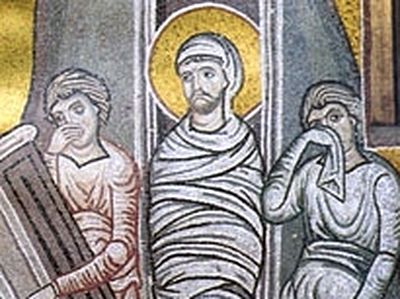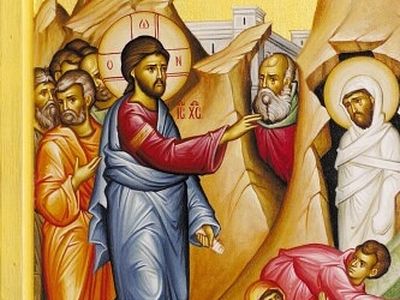Lazarus Saturday: the day before Palm Sunday each year, for the Eastern churches mark the transition from Lent, which formally ended last evening at vespers, to Holy Week proper, which begins tonight with the vespers of Palm Sunday. This morning the liturgy of Lazarus Saturday was celebrated, the only time in the year when the resurrection service of Sunday is celebrated on any other day.
Jesus Wept: In the Gospel of St. John, that Jesus wept at the tomb of Lazarus indicates His full humanity. A verse from last evening's Canon of St. Lazarus says: "O Lord, Thou hast shed tears for Lazarus, showing that Thou art man; and Thou hast raised him from the dead, O Master, showing to the peoples that Thou art the Son of God." (Canticle Four)
When those at the tomb saw Jesus weeping, they said, "See how he loved him." But there is perhaps more going on. For "when he saw [Mary] weeping and the Jews who came with her also weeping," Jesus was "deeply moved in spirit" and "troubled," and "deeply moved again." Dare we think that an element in the weeping of Jesus was a mixture of both sorrow and anger at death and the fate of man? Perhaps better than the word anger, which is a faculty of man to be used carefully, we might speak of the sort steely determination a soldier might have in going on the battlefield to rescue a fallen comrade. When the time comes, this certain something rises in the heart, and he becomes "bound and determined."
Christ is seeing the enemy of man here face to face in the corrupting, buried corpse of Lazarus, and it is this very enemy that steals our loved ones from before our face, and brings tears and bitter grief to the world generation after generation–this enemy is what Jesus has come to "take down," if you will, in his dying on the Cross: he is to trample down death by death.
In Gethsemane, the the full force of the passion of the Cup he is about to taste is the subject of the prayer of His Agony, and He, knowing the enemy, says to the Father, if this must be so in order to save men from death, so be it, "Thy will be done," that He might rescue those whom he loves–Lazarus, Mary, Martha, his disciples whom he has called friends, and you and me and all the world from death. His tears at the tomb of Lazarus are the tears of a man, but not sentimental. They are the strong tears of the hero who sets his face to pay the hard price, come what may. Thus:
"O Lord, we sing the praises of Thy might; O Christ, we sing the praises of Thy Passion. For through the one in Thy tender mercy Thou hast worked a miracle; and the other Thou hast as man accepted willingly for our salvation." (Canticle Four)






